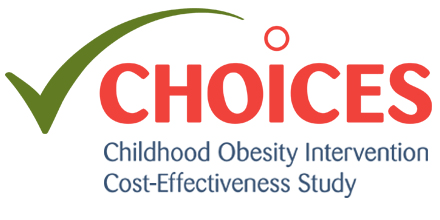Project Description
The Childhood Obesity Intervention Cost-Effectiveness Study (CHOICES) Project uses cost-effectiveness analysis to compare the costs and outcomes of different policies and programs promoting improved nutrition or increased physical activity in schools, early care and out-of-school settings, communities, and clinics.
CHOICES can help provide evidence for action, explain the impact on population, identify cost-effective and efficient strategies, guide resource investment, and cultivate alliances and support. Key partnership opportunities include the CHOICES Learning Collaborative Partnership (2015 – 2020) and the CHOICES Community of Practice (2020 – present). The CHOICES Community of Practice includes people whose work focuses on advancing obesity prevention, healthy eating, and active living and want to learn more about how cost-effectiveness analysis can advance their efforts.
The project is a collaboration among researchers at the Harvard T.H. Chan School of Public Health and the Milken Institute School of Public Health at The George Washington University. The CHOICES team also collaborates with the Association of State and Territorial Health Officials (ASTHO) and the National Association of County and City Health Officials (NACCHO)
Follow the CHOICES Project on Twitter and on LinkedIn!

Principal Investigators: Steven Gortmaker, PhD and Angie Cradock, ScD, MPE
Full Website: choicesproject.org
Funder: The JPB Foundation
Contact: choicesproject@hsph.harvard.edu
CHOICES Project Resources
Peer-Reviewed Publications
The CHOICES Project team has published research findings in peer-reviewed journals. The articles can be accessed below or on the CHOICES Project website.
- Zhao L, Park S, Ward ZJ, Cradock AL, Gortmaker SL, Blanck HM. State-Specific Prevalence of Severe Obesity Among Adults in the US Using Bias Correction of Self-Reported Body Mass Index. Prev Chronic Dis. 2023 Jul;20. doi:10.5888/pcd20.230005.
- Ward ZJ, Willett WC, Hu FB, Pacheco LS, Long MW, Gortmaker SL. Excess mortality associated with elevated body weight in the USA by state and demographic subgroup: A modelling study. eClinicalMedicine. 2022 Apr;48. https://doi.org/10.1016/j.eclinm.2022.101429.
- Kenney EL, Mozaffarian RS, Long MW, Barrett JL, Cradock AL, Giles CM, Ward ZJ, Gortmaker SL. Limiting Television to Reduce Childhood Obesity: Cost-Effectiveness of Five Population Strategies. Child Obes. 2021 May 10. doi: 10.1089/chi.2021.0016. Epub ahead of print. PMID: 33970695.
- Ward ZJ, Bleich SN, Long MW, Gortmaker SL. Association of body mass index with health care expenditures in the United States by age and sex. PLOS ONE.2021 Mar;16(3): e0247307. doi:10.1371/journal.pone.0247307.
- Kenney EL, Barrett JL, Bleich SN, Ward ZJ, Cradock AL, Gortmaker SL. Impact Of The Healthy, Hunger-Free Kids Act On Obesity Trends.Health Aff. 2020;39(7). doi:10.1377/hlthaff.2020.00133
- Ward ZJ, Bleich SN, Cradock AL, Barrett JL, Giles CM, Flax CN, Long MW, Gortmaker SL. Projected U.S. State-Level Prevalence of Adult Obesity and Severe Obesity. N Engl J Med. 2019;381:2440-50. doi: 10.1056/NEJMsa1909301
- Kenney EL, Cradock AL, Long MW, Barrett JL, Giles CM, Ward ZJ, Gortmaker SL. Cost-effectiveness of water promotion strategies in schools for preventing childhood obesity and increasing water intake. Obesity. 2019;27(12):2037-2045. doi:10.1002/oby.22615.
- Long MW, Polacsek M, Bruno P, Giles CM, Ward ZJ, Cradock AL, Gortmaker SL. Cost-Effectiveness Analysis and Stakeholder Evaluation of 2 Obesity Prevention Policies in Maine, US. Journal of Nutrition Education and Behavior. 2019 Aug [Epub ahead of print], pii: S1499-4046(19)30922-4.
- Daepp MIG, Gortmaker SL, Wang YC, Long MW, Kenney EL. WIC Food Package Changes: Trends in Childhood Obesity Prevalence. Pediatrics. 2019;143(5):e20182841.
- Ward Z, Long M, Resch S, Giles C, Cradock A, Gortmaker S. Simulation of Growth Trajectories of Childhood Obesity into Adulthood. N Engl J Med. 2017 Nov 30;377(22):2145-2153.
- Sharifi M, Franz C, Horan CM, Giles C, Long M, Ward Z, Resch S, Marshall R, Gortmaker S, Taveras E. Cost-Effectiveness of a Clinical Childhood Obesity Intervention. Pediatrics. 2017; 140(5):e20162998.
- Cradock AL, Barrett JL, Kenney EL, Giles CM, Ward ZJ, Long MW, Resch SC, Pipito AA, Wei ER, Gortmaker SL. Using cost-effectiveness analysis to prioritize policy and programmatic approaches to physical activity promotion and obesity prevention in childhood. Prev Med. 2016 Oct 20. pii: S0091-7435(16)30339-5.
- Long MW, Ward ZJ, Resch SC, Cradock AL, Wang YC, Giles CM, Gortmaker SL. State-level estimates of childhood obesity prevalence in the United States corrected for report bias. International Journal of Obesity.2016 Aug 30.
- Blondin KJ, Giles CM, Cradock AL, Gortmaker SL, Long MW. US States’ Childhood Obesity Surveillance Practices and Recommendations for Improving Them, 2014-2015. Prev Chronic Dis.2016;13:160060.
- Dietz WH, Gortmaker SL. New Strategies to Prioritize Nutrition, Physical Activity, and Obesity Interventions. Am J Prev Med. 2016 Apr 26. pii: S0749-3797(16)30069-1.
- Ward ZJ, Long MW, Resch SC, Gortmaker SL, Cradock AL, Giles C, Hsiao A, Wang YC. Redrawing the US Obesity Landscape: Bias-Corrected Estimates of State-Specific Adult Obesity Prevalence. PLoS ONE. 2016; 11(3): e0150735.
- Gortmaker SL, Wang YC, Long MW, Giles CM, Ward ZJ, Barrett JL, Kenney EL, Sonneville KR, Afzal AS, Resch SC, Cradock AL. Three Interventions That Reduce Childhood Obesity Are Projected To Save More Than They Cost To Implement.Health Aff. 2015 Nov 1;34(11):1932-9.
Strategy Profiles
The CHOICES Project team team developed these resources that describe the estimated benefits, activities, resources, and leadership needed for implementation. The information available in each could be useful for planning and prioritization purposes:
…and more! Browse all strategy profiles here.
Strategy Reports
The CHOICES Project team team developed these resources that describe the projected national population reach, impact on health and health equity, implementation costs, and cost-effectiveness for effective strategies to improve child health. This information can help inform decision-making around promoting healthy weight.
Browse all strategy reports here.
Stories from the Field
The Stories from the Field series feature examples of how partners have applied cost-effectiveness analysis to advance their work in health promotion and prevention in their city, county, or state.
…and more! Browse all Stories from the Field here.
Teaching Case Studies
The CHOICES Project team developed two teaching case studies to engage students in real-world situations and practice teamwork and problem-solving. Both CHOICES teaching case studies are free to download for teachers to use in their classrooms.
Making CHOICES in a Health Department: Case 1 (Introductory)
In this introductory teaching case, a fictional health department engages with the CHOICES Project’s Learning Collaborative Partnership to help them narrow down a list of potential strategies to reduce childhood obesity in their county through a cost-effectiveness lens. Materials available in this case study include a list of case materials, a narrative for students, a teaching note and lesson plan, a PowerPoint mini-lecture, a definitions document, and a data tables spreadsheet.
Making CHOICES in a Health Department: Case 2 (Advanced)
In this advanced teaching case, which builds on Case 1, a fictional health department continues to work with the CHOICES Project’s Learning Collaborative Partnership to determine how to implement an evidence-based strategy that requires substantial investment, but they face a variety of additional challenges such as state politics and the complexities of health policy. Materials available in this case study include a list of case materials, a narrative for students, a teaching note and lesson plan, a PowerPoint mini-lecture, a definitions document, a data tables spreadsheet, and a comparison of relevant interventions.
…and more! Browse all teaching case studies here.
Interactive Resources
CHOICES National Action Kit
The CHOICES National Action Kit provides a menu of strategies with good evidence that they can reduce excess weight gain, improve nutrition and physical activity environments, and promote related health behaviors. The kit allows you to compare up to four strategies at a time to help inform your organization’s decision-making around promoting healthy weight.
CHOICES Map of State & Local Efforts
The CHOICES Map of State & Local Efforts highlights findings from partnerships with state and local health agencies from the CHOICES Learning Collaborative Partnership and other partnership efforts of the CHOICES Project.
Browse more resources in the CHOICES Resource Library here.
Last updated: April 1, 2024

